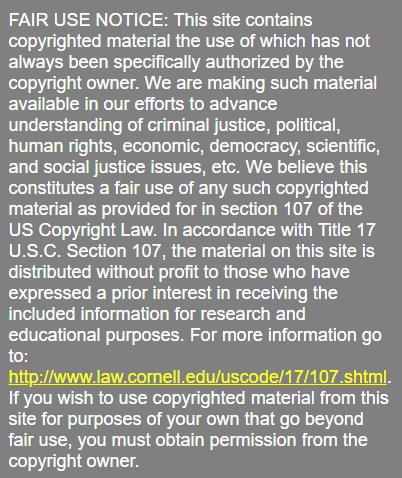Fair Use Disclaimers
Are you sharing someone else's work online? Do you know if it qualifies for 'fair use' under copyright law?
A Fair Use Disclaimer shows that you know you've borrowed material from a different source and that you're abiding by fair use laws. While it won't protect you if you're in obvious violation of the law, it can allow you to legally share all the great content you want with your audience.
Not sure what a Fair Use Disclaimer is or how it protects your business? Keep reading for everything you need to know about disclaimers, fair use and examples of these critical parts of your website.
What's a Fair Use Disclaimer?
A fair use disclaimer is a type of disclaimer or a message that gives a warning or limits liability outside of areas covered by the Terms and Conditions agreement.
Here's an example of a very standard Fair Use Notice from Columbia College Chicago (Note that "Notice" and "Disclaimer" are often used interchangeably):

The details of what's in this notice/disclaimer will make more sense as we get more into the topic in the following sections of this article.
What is Fair Use?
Fair use is part of the wider set of US copyright laws.
It says that using copyrighted material can be done without seeking rights to the work when you're doing things like:
- Commenting
- Criticizing
- Parodying
- Reporting
- Research
- Teaching
According to Stanford University, most fair use falls into two categories: Commentary and criticism, and parody.
Because you're not using the work as your own but rather are sharing the author's original work with your own comments, you might be using it for a "transformative purpose."
If the idea of "transformative" use of someone else's copyrighted work sounds vague, it's because it can be.
Fair Use in the Courts
Canadian rapper Drake and his associated publishers and record labels went to court when the musician sampled a recording from 1982 made by James Oscar Smith. Smith's estate argued that Drake and his team violated fair use by failing to seek rights to the spoken-word recording added into Drake's 2013 song "Pound Cake/Paris Morton Music 2."
The issue was "whether it was a fair use to alter a recording of a rap song and place it into a hip hop song with a different message, without authorization to use the musical composition." Drake cut up a 35-second sample of the song created by Jimmy Smith and rearranged the lyrics to alter the meaning of the original recording.
If the sample had been included in a documentary, the judge presiding over the case would have had to determine whether Drake used the song in a "transformative" manner. But because Drake used it in his song - as part of his art - the question transformed into an issue of who owned the copyright.
Drake ultimately won the lawsuit because it was clear to the court that he had transformed the piece. However, the suit was more complicated.
Drake's record company had found a copyright for the recording but had not sought rights for the composition. Yet, the composition was not registered with the copyright office. Because of the issues of ownership, neither side was awarded a summary judgment.
As you can see, both copyright law and fair use are complicated and very litigious.
If you intend to share, use, or repurpose the intellectual property - copyrighted or not - of anyone else, you need to protect yourself.
Failing to do so may result in millions of dollars in legal fees.
When and Why You Need a Fair Use Disclaimer
Any time you're borrowing any work from any medium and you're using it for a transformative reason, you need a Fair Use Disclaimer.
A Fair Use Disclaimer is not an admission of violating fair use nor does it say you're using content without permission. It protects you from the accusation of copyright infringement and demonstrates an element of responsibility about the nature of your work.
Ultimately, it dissociates the work you do from the work you borrow and acknowledges that you know the law.
As demonstrated, fair use is complicated, and it requires us to hedge bets about how the market and the law will perceive the use of work.
Without a disclaimer, you open yourself up to accusations, cease and desist letters, and even lawsuits that could prevent you from running your business. It could even end your website.
When you include a prominently displayed disclaimer, you'll have an easier time dealing with contentious issues that aren't clear-cut. For example, if a case is close and the court can see you've clearly placed a disclaimer on your page, then it may weigh more in your favor than without the disclaimer.
However, using a disclaimer won't help you if you're use of materials is violating the fair use policy.
If you're already violating one or more of the above principles or the work clearly isn't transformative, no disclaimer will weigh in your favor.